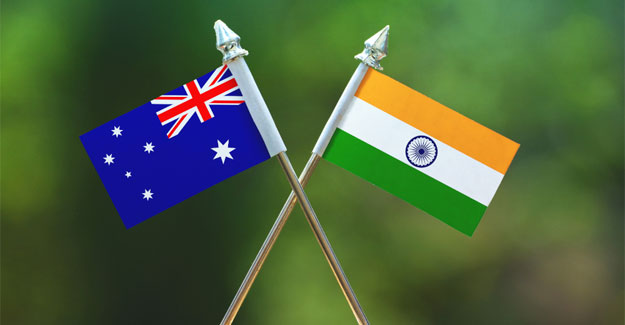
India, Australia FTA To Double Trade, Generate 1 Million Jobs In Five Years
The agreement will also give about 85% of Australia’s exports zero-duty access to the Indian market, including coal, sheep meat and wool, and lower duty access on Australian wines, almonds, lentils, and certain fruits. India and Australia have signed an Economic Cooperation and Trade Agreement (IndAus ECTA) which is set to provide zero-duty access to 96% of India’s exports to Australia including shipments from key sectors such as engineering goods, gems and jewellery, textiles, apparel and leather. The pact is expected to boost bilateral trade in goods and services to US$ 45-50 billion over five years, up from around US$ 27 billion, and generate over one million jobs in India, according to a government estimate. The agreement will also give about 85% of Australia’s exports zero-duty access to the Indian market, including coal, sheep meat and wool, and lower duty access on Australian wines, almonds, lentils, and certain fruits. Zero-duty access for Indian goods is set to be expanded to 100% over five years under the agreement. In February, India signed an FTA with the UAE and is currently working on FTAs with Israel, Canada, UK and the EU. The agreement was signed by Commerce and Industry Minister Piyush Goyal and Australia’s Minister for Trade, Tourism and Investment Dan Tehan in a virtual ceremony witnessed by Prime Minister Narendra Modi and Prime Minister Scott Morrison. “This is indeed a watershed moment for our bilateral relationship,” Modi said, adding that the agreement would make it easier for both countries to exchange students, professionals and tourists which in turn would strengthen ties. Morrison said that the agreement represented “one of the biggest economic doors there is to open in the world today.” Officials pointed out that a number of Indian exports currently face a tariff disadvantage of 4-5% in many labour-intensive sectors relative to competitors — those with FTAs with Australia — such as China, Thailand, Vietnam. Removing this barrier, officials said, could enhance merchandise exports significantly. Bilateral trade in goods and services between India and Australia stood at US$ 27.5 billion in FY2021. Goyal said merchandise exports to Australia had grown faster than exports to any other country in FY2022. Officials said Indian goods and services exports to Australia are expected to reach US$ 20 billion in FY2027 and US$ 35 billion in FY2035, up from about US$ 10.5 billion in 2021. Lower duties would be provided on products such as cotton, lentils, oranges, almonds and mandarins based on tariff-rate quotas which would see tariffs return to pre-agreement levels for imports above threshold quantities. For instance, lentil imports up to 1.5 lakh tonnes from Australia will only attract total import taxes of 15%, compared to 30% duties on lentil imports from countries with which India does not have trade agreements. The agreement also includes strict rules of origin to prevent any routing of products from other countries and provides for a safeguard mechanism to address any sudden surges in imports of a product.
Textile Excellence
If you wish to Subscribe to Textile Excellence Print Edition, kindly fill in the below form and we shall get back to you with details.













